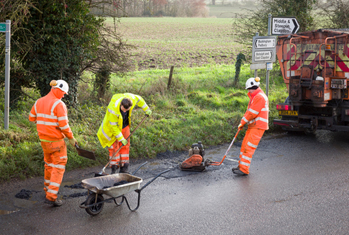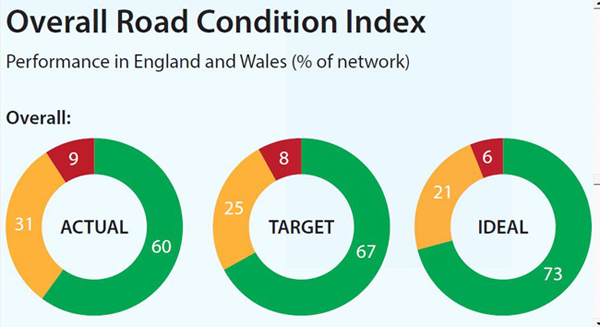The estimated one-time cost to get local roads in England and Wales back into a ‘reasonable, steady state’ is £10.24bn, according to this year’s ALARM (Annual Local Authority Road Maintenance) survey – the popular benchmark for the upkeep of council networks.
Last year the figure was £11.14bn, which had risen significantly from £9.79bn the previous year.
The backlog breaks down as £77.2m per authority in England, although it is only £27.6m per authority in London, and £28.9m in Wales.
The time it would take to clear the maintenance backlog if local authorities had the funding and resources available to do the work is now estimated to be 10 years, down from 11 years.
Although the average time before a road is resurfaced was 68 years across the survey, it varied significantly from 83 years in England (but 31 years in London) to 46 years in Wales.
 The slight improvement in the figures from last year may reflect the increase in funding. Across England and Wales total highway maintenance expenditure on the carriageway itself in 2020/21 was around £2.17bn, up from £1.77bn last year but less than the £2.23bn reported in ALARM 2019.
The slight improvement in the figures from last year may reflect the increase in funding. Across England and Wales total highway maintenance expenditure on the carriageway itself in 2020/21 was around £2.17bn, up from £1.77bn last year but less than the £2.23bn reported in ALARM 2019.
Reported budgets have increased by 15%, helped by extra central Government cash such as the Pothole Fund in England. Average budgets were £23.8m per authority in England and Wales, compared to £20.7m in the 2020 survey.
However, budgets are lower than they were two years ago, averaging £24.5m in 2019, with road conditions ‘yet to see any significant improvement’.
Around three-fifths (60%) of highway maintenance budgets is reported to be funded by central government, while the remainder comes from local authorities’ own sources.
AIA chair Rick Green said: ‘The last year has been like no other and the hidden heroes responsible for maintaining our local roads should be proud of the role they played working throughout the pandemic to keep our key workers and emergency services moving, supermarket shelves stocked and vaccines distributed.
‘While the extra funding in 2020/21 was welcomed, using it to repeatedly fill in potholes is essentially a failure as it does nothing to improve the resilience of the network. The average frequency of road surfacing is now once every 68 years and the bill to fix the backlog of maintenance work on our local roads in England and Wales remains in excess of £10bn.
‘It is clear that a longer-term approach to local road funding is needed, similar to the five-year commitment made to the strategic road network in the two Roads Investment Strategy (RIS) periods, to allow local authority highway engineers to plan ahead and implement a more proactive, sustainable and cost effective whole life approach to maintaining the network.’
The Government has said that a multi-year settlement from 2022-2023, potentially for five years, giving Department for Transport officials around six months to make the case to Treasury for long term funding, Highways understands.
Gareth Day, Hanson UK asphalt managing director, said: ‘We are proud to be a member of the AIA and support its call for a five-year approach for local road funding, in line with the commitment that has been made for motorways and major A roads through the RIS.
‘The findings of the 2021 survey demonstrate the impact that inconsistent funding is having on the condition of local roads and a longer-term approach will allow highway engineers to plan ahead for the benefit of all road users.’
The AIA said that while highway maintenance budgets are set annually, ‘all respondents agreed that guaranteed, longer term funding helps increase efficiency and provide a more durable road network’.
More than half (56%) indicated that five years is the optimum term, with a further 34% stating that 10 years would be ideal.
The percentage of the highway maintenance budget spent on the carriageway increased from 50% in 2019/20 to 52% across ALARM respondents. Again, this was lower than two years ago (56%).
In 2020/21 the total shortfall in carriageway maintenance budgets was estimated to be £752.6m (£4.6m per authority in England, £4.5m per authority in London and £3.8m per authority in Wales).
The average proportion of the carriageway maintenance budget spent on reactive maintenance (i.e. work not planned for at the beginning of the year) was 21% in England, 25% in London and 30% in Wales.
The Asphalt Industry Alliance (AIA), which produces the survey, said that while it is extremely difficult for local authorities to predict and allocate the percentage of budget required for reactive maintenance, but it is generally agreed that around 16% is considered a more ideal level.
This year’s results show that the legacy of inconsistent funding in England and Wales is still preventing highway engineers from providing long-term, cost effective maintenance improvements for local roads, the AIA said. It added that using highway maintenance cash to repeatedly fill in potholes is ‘essentially a failure’. Road Condition Index (RCI)
For the first time this year, authorities were asked what their ideal RCI profile would look like if they had sufficient funds and resources.
While 100% of the network will not be in perfect condition 100% of the time, authorities said the ideal profile of their networks should be: 73% GREEN, 21% AMBER and 6% RED.

‘Responses received show that, unsurprisingly, no category of road currently achieves these aspirational ideal levels,’ the AIA said.
It added that this year’s findings do show that the reduction in target levels reported over the last two years has halted, with target figures now similar to those reported in 2019.
‘Although the increased budgets reported this year may have led to the prospect of achieving more ambitious targets, the reality is that these are still not being met,’ the AIA said.
The alliance is a partnership between the Mineral Products Association and Eurobitume UK, the two principal bodies which represent suppliers of the raw materials for asphalt.
The body said local authorities reported that if they had enough funds to meet their own target conditions across all road types, there could be an additional 14,400 miles of local roads in a good state of repair and another 2,000 fewer miles in need of urgent repair.
Materials innovation
Away from the headline announcements on defects, the survey found councils were making developments in low carbon working, although progress was slower than might have been expected.
‘Almost 80% of local authorities in England and Wales have declared a climate emergency yet only 23% of respondents confirmed that their authority has a quantified target to reduce the carbon footprint resulting from the procurement of road surfacing materials,’ the report said.
However, there were signs that warm mix asphalts (WMA), which can reduce the CO2 emissions associated with asphalt production by up to 15%, were becoming the norm in the industry after the UK spent years trailing behind countries like the US in their use.
‘Over 60% (62%) of respondents include WMA on their asphalt specification list and, of those that are not currently including it, 72% are looking to adopt it in the future,’ the report found. Climate change is having an impact on the network according to councils.
Adverse weather conditions, particularly wetter winters with more intense downpours and hotter, drier summers, coupled with increased volume and weight of traffic and the age of the network, can result in accelerated deterioration and unpredicted failures.
One survey respondent said successive dry summers had caused excessive ground shrinkage, which has resulted in a significant number of sites where subsidence has necessitated structural maintenance.
Another authority said it had seen a big increase in unforeseen costs due to carriageway collapse and major failures caused by a lack of investment.
The total annual cost of dealing with compensation claims was £15m, equivalent to £73.14 for each mile of the local road network which totals 205,100 miles.





